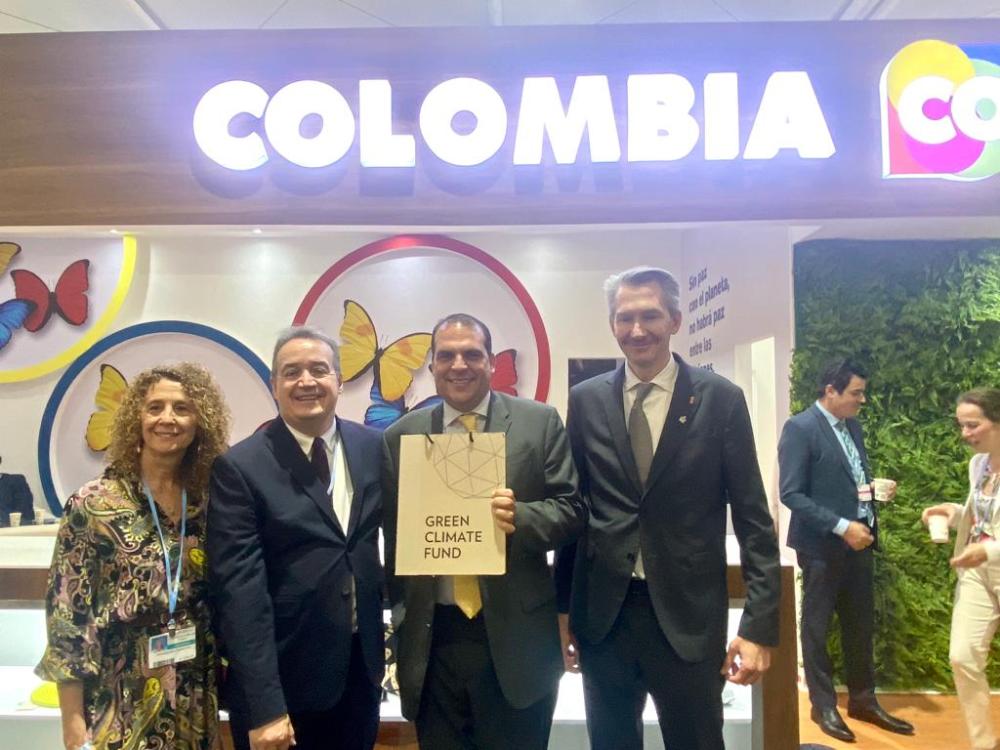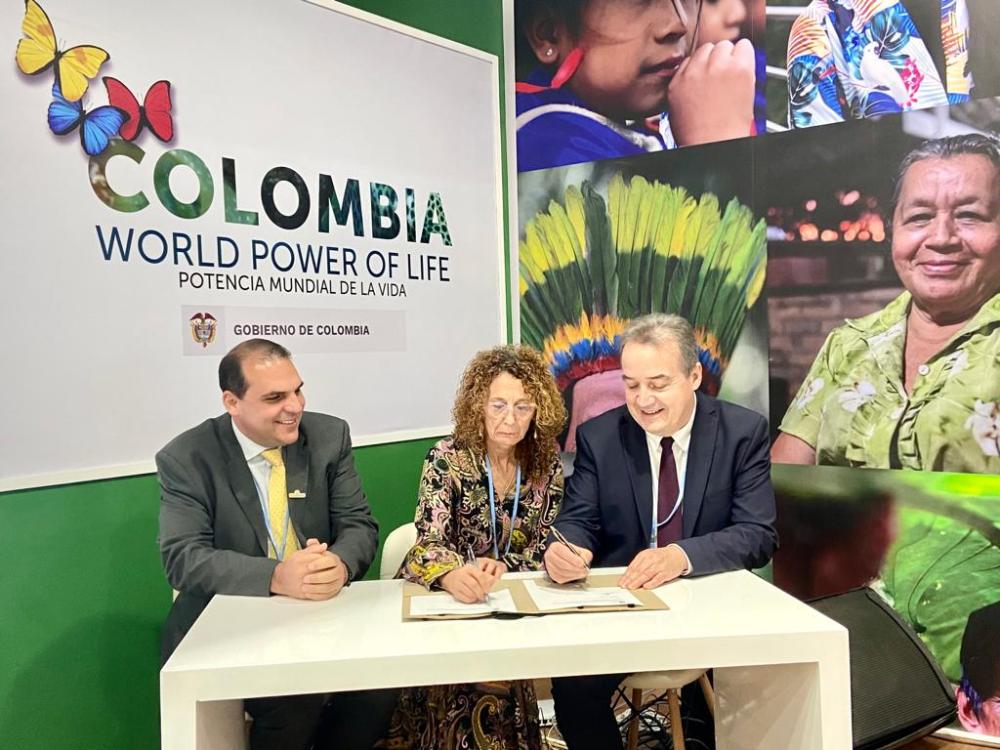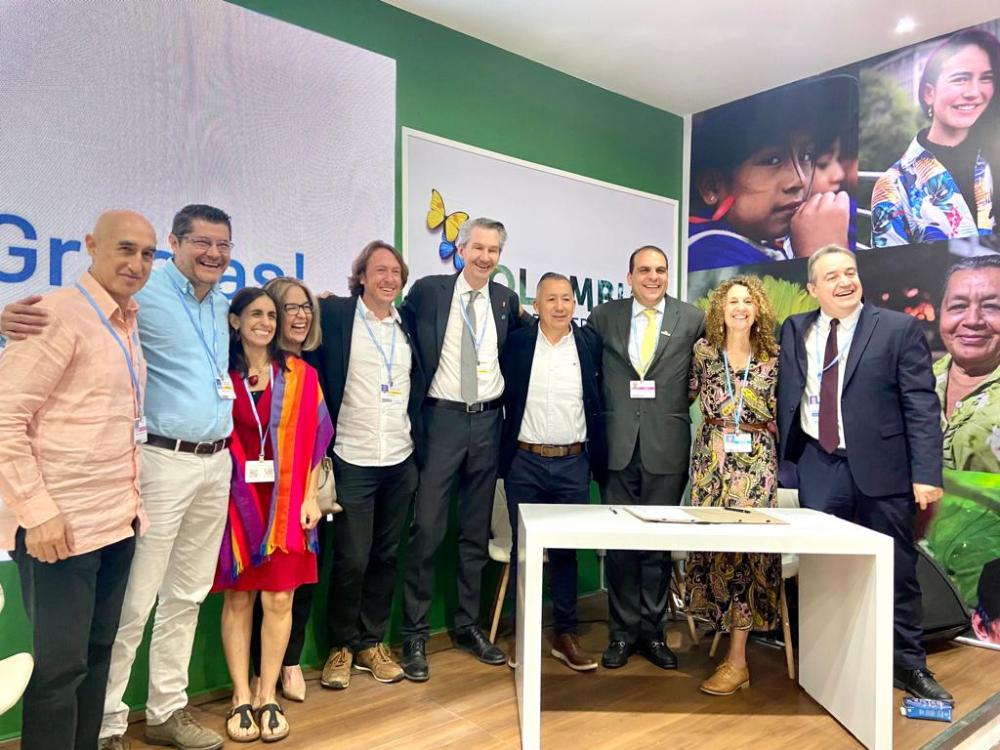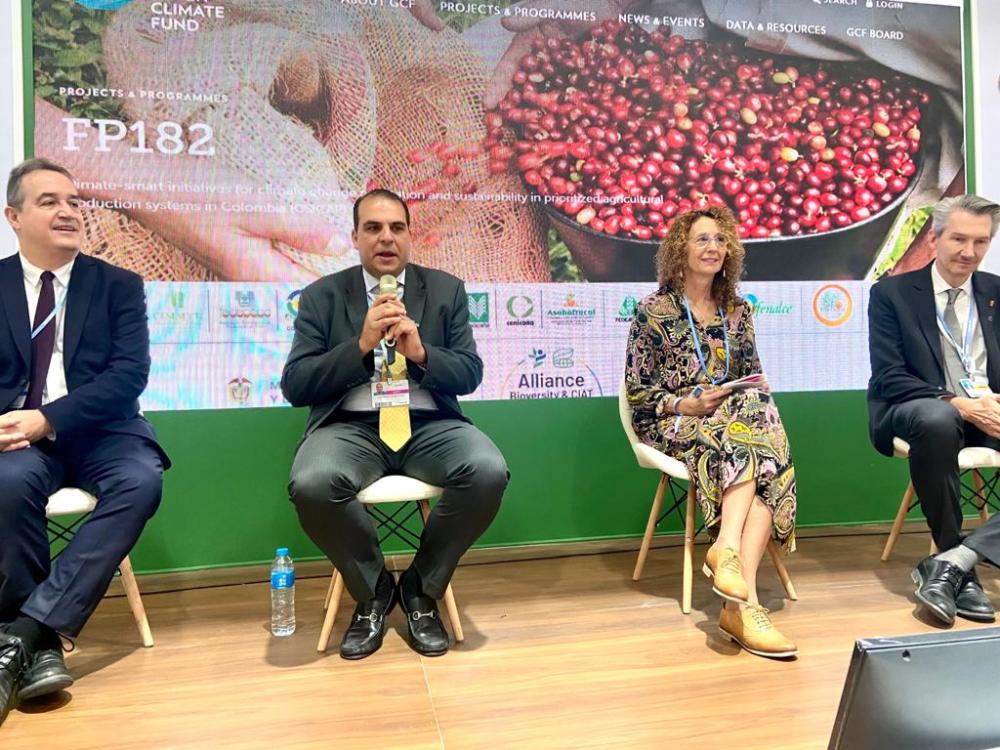Manuel Otero, IICA Director General, emphasized the efforts of the government and the Colombian production sector to harness the enormous potential of the country to be a climate-smart production power, remarking that, “Colombia’s achievement in signing this agreement—that will allow it to satisfy the emission targets of the agriculture sector that the country committed to under the Paris Agreement—sets an example for agriculture throughout Latin America and the Caribbean”.

Sharm El-Sheikh, Egypt, 16 November 2022 (IICA) – The Director General of the Inter-American Institute for Cooperation on Agriculture (IICA), Manuel Otero, commended Colombia on the signing of an agreement between its Ministry of Agriculture, the Green Climate fund and CAF-Development Bank of Latin America. Under the agreement, this South America country will access non-reimbursable grants and loans valuing almost 100 million dollars, thereby positioning its agriculture sector as a leader in climate change adaptation and mitigation.
Within the framework of COP27, which is now underway in Sharm El-Sheikh, Egypt, the Deputy Minister of Agriculture and Rural Development of Colombia, Luis Alberto Villegas, witnessed the signing of “Credit and Grant Agreements between the Green Climate Fund (GCF) and the Andean Development Corporation- Development Bank of Latin America (CAF)”, to the tune of nearly 100 million dollars. The funds are earmarked for the “Climate-smart Initiatives for Climate Change Adaptation and Sustainability in Prioritized Agricultural Production Systems in Colombia” (CSICAP) project, including the rice, corn, potato, banana, sugar cane, raw cane sugar and coffee sectors, as well as beef and dairy cattle.
The project is valued at more than 99.9 million dollars. Of this amount, 48.2 million dollars will be non-reimbursable grants from the Green Climate Fund; approximately 35.3 million dollars will be derived from an agreement between the GCF and CAF; and the remaining 16.4 million will be counterpart resources from the Ministry of Agriculture and Rural Development, CIAT (Alliance of Bioversity International and the International Center for Tropical Agriculture) and farmer associations participating in the project.

During the official signing ceremony of the agreement at Colombia’s pavilion at COP27, Deputy Minister Villegas remarked that, “This financial support has provided Colombia with a world class project, which will enable it to address and tackle the impact and effects of climate change in nine agricultural production subsectors that are of strategic importance to food security; rural employment; exports and the sector’s share in the gross domestic product (GDP); and also the improved income and quality of life of rural producers”.
“Colombia, and in particular the Ministry of Agriculture and Rural Development, views the CSICAP project as Colombia’s ticket to modernize agricultural production, through the adoption of climate smart, climate change resilient and a low-carbon emission systems. We will apply information technologies, such as the use of artificial intelligence to achieve Agriculture 4.0; climate services; and genetic improvement to increase productivity in the field and the competitiveness of our products in international markets, in line with environmental sustainability criteria”, he added.
Manuel Otero, IICA Director General, emphasized the efforts of the government and the Colombian production sector to harness the enormous potential of the country to be a climate-smart production power, remarking that, “Colombia’s achievement in signing this agreement—that will allow it to satisfy the emission targets of the agriculture sector that the country committed to under the Paris Agreement—sets an example for agriculture throughout Latin America and the Caribbean”.
Also in attendance at the signing of the agreement were Yannick Glemarec, Executive Director of the Green Climate Fund (GCF); Alicia Montalvo Santamaría, Manager of Climate Action and Positive Biodiversity at CAF-Development Bank of Latin America; and Juan Lucas Restrepo, CEO of the Bioversity – CIAT Alliance, among other senior officials.

Deputy Minister Villegas explained that the Ministry of Agriculture and Rural Development will lead the implementation of the agreement with permanent support from the National Planning Department (DNP); the Ministry of Finance and Public Credit (MHCP); CIAT; CAF; production associations such as FEDEARROZ, FENALCE, FEDERACAFE, FEDEPAPA, AUGURA, ASBAMA, ASOHOFRUCOL, FEDEGAN and ASOCAÑA; as well as research centers such as CENICÑA, CENIBANANO and CENICAFE. He noted that the agreement will allow for modernizing agricultural production to develop climate-smart, climate-resilient and low-carbon production systems.
The agreement provides for the use of information technologies, such as artificial intelligence to achieve Agriculture 4.0; climate services; and genetic improvement to increase productivity in the field and the competitiveness of Colombian products in international markets, in line with environmental sustainability criteria.
The agreement, which will solidify Colombia’s standing as a global leader in adapting the agriculture sector to the impacts and effects of climate change, will provide credit conditions that will benefit the country’s finances, as well as contribute to the fulfillment of the commitments set out in the Nationally Determined Contribution (NDC)—namely to implement innovative adaptation initiatives in nine agricultural subsectors and reduce GHG emissions by 51% by 2030.

Specifically, over an area covering 967,997 hectares, the project will contribute to reducing the sector’s GHG emissions by 9.3 million tons of CO2 equivalent, strengthen the agriculture sector’s capacity to respond to extreme events triggered by climate change and climate variability, reduce production losses, improve the sector’s competitiveness, and guarantee food security for Colombians in the medium and long term.
A total of 619,691 producers will be the direct beneficiaries of the project, which will indirectly benefit an additional 1,075,000 producers, through the development of new business models that will facilitate their vertical integration into the value chain.
More information:
Institutional Communication Division.
comunicacion.institucional@iica.int











